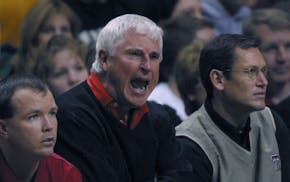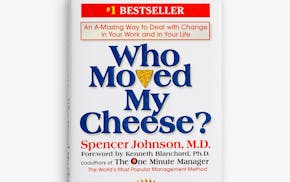From the beginning, we are taught by our parents what not to do. Don't cross the street without looking. Don't go to bed without brushing your teeth. Don't talk back. Don't get in trouble. And on and on.
Similarly, from an early age we are told by our parents, "Don't worry, honey. Everything will be all right." Or "Let me kiss it and make it well." From infancy up, we're inundated with platitudes that may provide short-term diversion but don't work in the long run.
One of my favorite books, Norman Vincent Peale's "The Power of Positive Thinking," is a classic bestseller that inspired an optimistic perspective for millions of Americans. I was deeply honored when Dr. Peale wrote an endorsement for my first book, "Swim With the Sharks Without Being Eaten Alive."
Now Bob Knight, the legendary college basketball coach, has written an inspirational and entertaining rebuttal to Dr. Peale's book, explaining why negative thinking will actually produce more positive results, in sports and in daily life. His book is titled, "The Power of Negative Thinking."
Known for his fiery temperament, Coach Knight feels that most basketball games are not won; they are lost. That's why his coaching philosophy is to instill discipline by preparing to win, rather than hoping to win.
Preparation keeps you from beating yourself. In his locker rooms, he posted a sign that read, "Victory favors the team making the fewest mistakes." He writes about the value of watching game film with his team to pinpoint mistakes "and especially patterns of mistakes so they don't occur again."
A coach is always teaching. He talks about free-throw shooting, which was typically a strength of a Bob Knight-coached team. He says many players struggle making free throws when the game is on the line. One of the reasons is the pressure.
He explains that it's really tough to simulate game conditions like that, so he would stop practice and pick a player to shoot two free throws. If he made both of them, they would go on with practice or practice would be over, but if he missed, it meant more running. This exercise helped players focus more at crunch time.
"The Power of Negative Thinking" is punctuated with humorous stories. For example, when Coach Knight was about to take the court to coach his first game at Army, he thought the team should say a prayer in the locker room, like most of his prior coaches had done. As he was walking out to the court, an old trainer put his arm around his neck and said, "Son, for what it's worth, you and prayer are not a good mix."
Coach Knight provides his two candidates for the greatest words in the English language: "No" and "Don't."
"I've had players I've told over and over and over again, 'No, that is not what we want,' " Knight writes. "The words 'no' and 'don't' are important parts of the power of negative thinking, along with a whole long list of imperatives just as firm and final. …
"Don't and can't are obviously negative phrases, but putting the words into use can bring very positive results."
He points out that seven of the Ten Commandments start with "Thou shalt not …" He even developed his own Ten Commandments, including:
• Don't accept the status quo. Look for better when others are satisfied.
• Always question. The best of all questions: Why?
• Look for improvements to make in yourself or bad habits to break.
• Never think talent alone will determine the outcome.
• Never talk too much. Get yourself a degree from the Shut-Up School.
Mackay's Moral: "Everybody wants to win, but not everyone wants to prepare to win." — Bob Knight
Harvey Mackay is a Minneapolis businessman. Contact him at 612-378-6202 or e-mail harvey@mackay.com.
Mackay: Approach AI with a mindset of collaboration rather than fear

Mackay: The key to winning in sports, business and life is practice

Mackay: Humor can make even dire situations bearable

Mackay: Want a raise? How and when you ask for it matter


